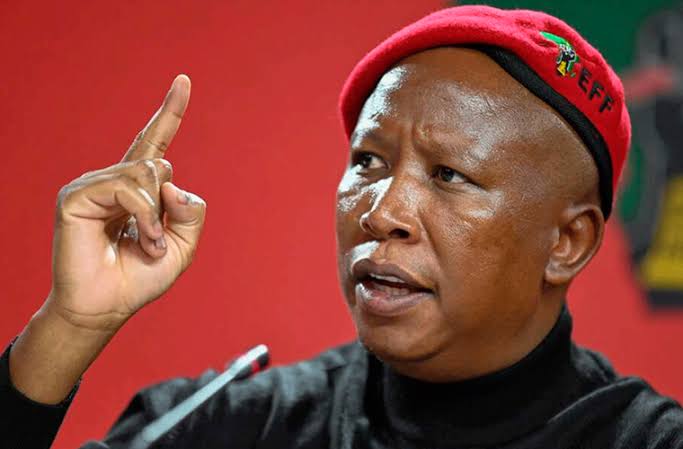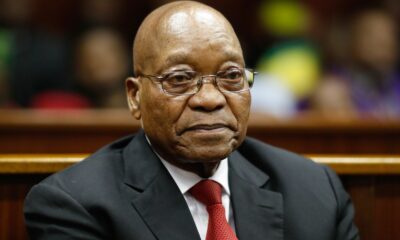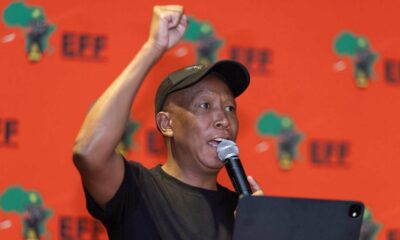News
Malema Found Guilty of Hate Speech: Court Warns of Dangerous Incitement

EFF leader Julius Malema has once again found himself at the centre of controversy, this time not on a rally stage, but in a courtroom. The Western Cape Equality Court has ruled that his fiery 2022 speech, in which he told supporters to “never be scared to kill” racists, crossed the line from political theatre into hate speech.
The verdict is not just about one speech. It touches the raw nerves of South Africa’s unresolved racial wounds, the responsibility of political leaders, and the thin line between revolutionary rhetoric and incitement to violence.
A Rallying Cry That Went Too Far
The case stems from an EFF rally in Cape Town, where Malema told the crowd that any racist who attacked party members or leaders was effectively signing their “application to meet [their] maker.” He went further, declaring: “A revolution demands at some point there must be killing because the killing is part of a revolutionary act.”
For Malema’s critics, these were not metaphors. They were marching orders. The South African Human Rights Commission (SAHRC), alongside a private complainant, argued that his words carried the potential to ignite racial violence in a country still grappling with the legacy of apartheid.
Judge Mark Sher agreed. In his ruling, he drew parallels with the way minorities in historyJews, Muslims, Tutsiswere vilified before being targeted in acts of mass violence. “Calling someone a racist in South Africa,” Sher said, “inevitably invokes detestation and enmity. To then call for their killing is vigilantism and incitement of the most extreme form.”
The Political Fallout
The Democratic Alliance (DA) wasted no time in framing the judgment as a win for constitutional values. Party leader John Steenhuisen said the ruling reaffirmed South Africa’s commitment to a free and non-racial society. “For too long, the world has watched as Julius Malema has incited violence and division. This is a victory for the rule of law and for South Africans who refuse to be dragged backwards.”
The DA also raised international concerns, pointing to Malema’s recent comments made abroadincluding during a high-profile visit to Washington, where his rhetoric reached global ears. “South Africa’s reputation cannot withstand leaders who normalise hatred,” Steenhuisen warned.
Civil society echoed the sentiment. The Inclusive Society Institute argued that inflammatory rhetoric, whether technically legal or not, has no place in a country still trying to build social cohesion. “This case crossed into outright illegality. South Africa’s fragile social fabric cannot bear leaders who treat violence and racism as political slogans,” the group said.
Social Media Reactions: Polarised as Ever
On X (formerly Twitter), reaction was predictably divided. Supporters of Malema defended him as a revolutionary voice speaking uncomfortable truths. “When he says kill the racists, he’s talking about defending ourselves against oppression,” one user wrote.
But many others saw the ruling as overdue accountability. “We are trying to build a democracy, not another Rwanda. Words matter, especially from leaders,” another user posted.
This split reaction reflects the larger dilemma: South Africa’s political culture often thrives on sharp rhetoric, but in a country where tensions remain high, those words carry more weight than in most democracies.
A Country Still Wrestling with Words and Wounds
The ruling against Malema is as much a mirror of the nation as it is a judgment on a man. South Africa’s history has shown how easily language can inflame division. Phrases like “Kill the Boer, kill the farmer” have long sparked debate about the limits of free speech in a country where reconciliation remains fragile.
This latest case may set a precedent. It sends a message that freedom of expression, while fiercely protected in South Africa, cannot extend to calls for violence, even when cloaked in the language of revolution.
Judge Sher put it plainly: when such words come from the leader of one of South Africa’s largest political parties, they carry the potential to “foment racial violence on a large scale.”
What Comes Next
For Malema and the EFF, the ruling may be framed as an attack on political expression. But for many South Africans, it is a reminder that the country’s democracy though loud, contested, and messy, has boundaries.
The bigger question is whether this judgment will curb the culture of incendiary rhetoric across politics. Because in a society this fractured, words don’t just echo, they explode.
{Source: The Citizen}
Follow Joburg ETC on Facebook, Twitter , TikTok and Instagram
For more News in Johannesburg, visit joburgetc.com



























